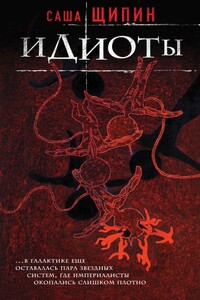36 Arguments for the Existence of God - [40]
“Now, Roz. We’re old enough friends to speak perfectly honestly, aren’t we?”
“Perfectly honestly? I don’t know whether we’ll ever be old enough for that, not even if my crack team of researchers come through for me. But proceed.”
“You’re not actually saying that you’re interested in me romantically? Not after all these years. We’re in such different places from where we were back then.”
“I’d say that’s probably all for the good. We weren’t even old enough to be too young for each other.”
“Part of my being in a different place now is that I’m with Lucinda. It’s a wonderful place for me to be.”
Cass had kept his gaze fastened on the jeweled depths of the Rioja. Roz waited for him to look her in the eye before she spoke.
“Do you want to be in that same place for two hundred years?”
“Not a day less.”
“Well, then, the least you could do, Cass Seltzer, would be to become a friend of the Immortality Foundation!”
He burst out laughing, as much in relief as anything else. Roz had had him going there. The rest of the meal continued with more Rioja and laughter, and they’d even splurged on a dessert: besos de amor, dates stuffed with marzipan and drizzled with tamarind sauce. Marco, their waiter, had bent low to kiss Roz’s hand in farewell, and Roz had patted him tenderly on the cheek.
VIII The Argument from the Existence of the Poem
Gideon Raven had always had a rigorous bent to his mind. He’d come to identify this as his major problem. It made him panicky to step from one thought to the next without some connective scaffolding, even if slippery and narrow. It was a form of cognitive acrophobia, and he was acropho-bic to begin with.
He’d close his eyes and picture himself stepping tentatively out into midair, his jumpy foot nervously feeling for something solid before advancing. Even in his imagination he was an earth-crawler, eyes filled with dirt, unable to fling himself forward an inch, much less streak like a shooting star.
Step! he’d urge his dangling doppelgänger. Step and be saved! Cling and be damned! O ye of little freaking faith.
It was why his poetry had never been worth a damn, why it had progressed from middling to mute. It was why, after a full dozen years, he was still a graduate student, which was to be something a little less than human, the determination of his life for someone else to decide. He railed against Jonas, but he knew he deserved no better than to spend his life paralyzed in this purgatory of pedantry.
He could, of course, make a decisive move. It was theoretically in his power. He could call it quits and leave academia, dip his arms up to his elbows in the river of cash flowing from trickle-down economics. Three of the five original Klapper defectors who had decided not to move to Weedham were already learning how to program computers, and the other two had applied to law schools.
But that was the thing about purgatory. It voided volition. Obsessed with genius, he had never been further from it. Genius was a matter of incantatory intuitions and phosphorescent blasts into the dark. Genius was a matter of thunderclap reasons, of which reason knew nothing. Genius was oracular, overweening, and severe. It left it to others to grub around in dusty doubts and cavil in insect voices.
All of Klapper’s students obsessed unhealthily on the nature of genius, its signs and siphorot, the Kabbalistic term for emanations-Jonas had been introducing Kabbalistic terms more and more frequently-though in obsession, as in all things, Gideon outstripped Klapper’s other students. They recognized the unwholesomeness of their preoccupation, its self-destructive futility and navel-gazing focus, but that was hardly a deterrent. Genius itself is diseased and self-destructive, antisocial and ill-mannered. It’s also the only thing that redeems us.
In the metaphor of the Great Chain of Being, man is assigned a place between the angels and the animals, but that isn’t exactly right. Between man and the angels there’s another ontological stratum, vanishingly slim and eternally endangered, occupied by the men and the women of genius. As the angels communicate only with the angels, and the animals with the animals, so the geniuses speak each to each, sometimes overhearing phrases fallen from the angels up above them, as we, in turn, overhear them.
I do not think they will speak to me.
There you go again, schmuck. That’s the whole problem. You can’t even talk to yourself without sounding like someone else.
Nothing came to Gideon pure and unblemished. He was sophisticated, in the original meaning, defiled and desecrated. If he didn’t love Lizzie so much, he’d have offed himself last week.
And he’d never write poetry again. He’d never get out an original line again. Every line he heard could be traced back to someone. The perversity of persuasion had slimed everything.
The more Cass got to know Gideon, the more aware he grew of the man’s tunneling despair. It was strange, since Cass admired Gideon so much. Aside from Jonas Elijah Klapper-who inhabited another category of being altogether-Gideon was the most extraordinary person Cass knew.

В книге рассказывается история главного героя, который сталкивается с различными проблемами и препятствиями на протяжении всего своего путешествия. По пути он встречает множество второстепенных персонажей, которые играют важные роли в истории. Благодаря опыту главного героя книга исследует такие темы, как любовь, потеря, надежда и стойкость. По мере того, как главный герой преодолевает свои трудности, он усваивает ценные уроки жизни и растет как личность.

Настоящая книга целиком посвящена будням современной венгерской Народной армии. В романе «Особенный год» автор рассказывает о событиях одного года из жизни стрелковой роты, повествует о том, как формируются характеры солдат, как складывается коллектив. Повседневный ратный труд небольшого, но сплоченного воинского коллектива предстает перед читателем нелегким, но важным и полезным. И. Уйвари, сам опытный офицер-воспитатель, со знанием дела пишет о жизни и службе венгерских воинов, показывает суровую романтику армейских будней. Книга рассчитана на широкий круг читателей.

Боги катаются на лыжах, пришельцы работают в бизнес-центрах, а люди ищут потерянный рай — в офисах, похожих на пещеры с сокровищами, в космосе или просто в своих снах. В мире рассказов Саши Щипина правду сложно отделить от вымысла, но сказочные декорации часто скрывают за собой печальную реальность. Герои Щипина продолжают верить в чудо — пусть даже в собственных глазах они выглядят полными идиотами.

Роман «Деревянные волки» — произведение, которое сработано на стыке реализма и мистики. Но все же, оно настолько заземлено тонкостями реальных событий, что без особого труда можно поверить в существование невидимого волка, от имени которого происходит повествование, который «охраняет» главного героя, передвигаясь за ним во времени и пространстве. Этот особый взгляд с неопределенной точки придает обыденным события (рождение, любовь, смерть) необъяснимый колорит — и уже не удивляют рассказы о том, что после смерти мы некоторое время можем видеть себя со стороны и очень многое понимать совсем по-другому.

Есть такая избитая уже фраза «блюз простого человека», но тем не менее, придётся ее повторить. Книга 40 000 – это и есть тот самый блюз. Без претензии на духовные раскопки или поколенческую трагедию. Но именно этим книга и интересна – нахождением важного и в простых вещах, в повседневности, которая оказывается отнюдь не всепожирающей бытовухой, а жизнью, в которой есть место для радости.

«Голубь с зеленым горошком» — это роман, сочетающий в себе разнообразие жанров. Любовь и приключения, история и искусство, Париж и великолепная Мадейра. Одна случайно забытая в женевском аэропорту книга, которая объединит две совершенно разные жизни……Май 2010 года. Раннее утро. Музей современного искусства, Париж. Заспанная охрана в недоумении смотрит на стену, на которой покоятся пять пустых рам. В этот момент по бульвару Сен-Жермен спокойно идет человек с картиной Пабло Пикассо под курткой. У него свой четкий план, но судьба внесет свои коррективы.